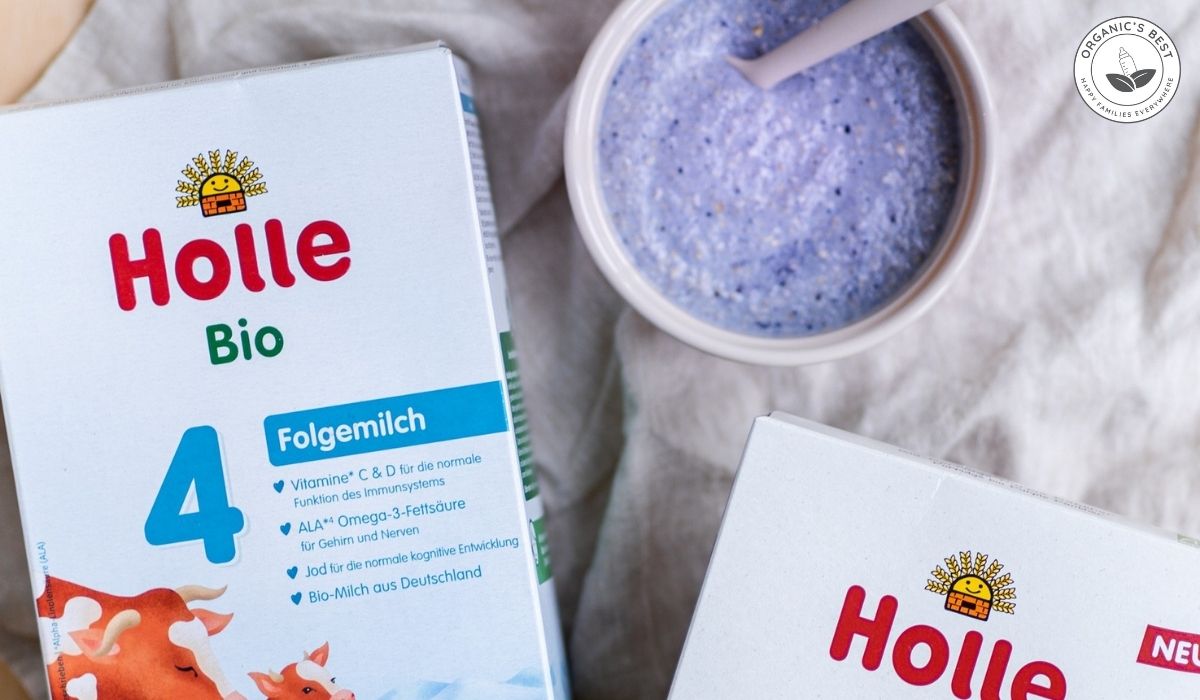Click to Get 2 FREE Boxes/Cans
Only New Customers! Click HERE to Get 2 Extra Boxes/Cans for Free With Your First Order.
BABY FORMULA
Offering new parents top-quality European infant formula from renowned brands like HiPP, Holle, Kendamil, and more. If you’re uncertain about which product to choose, our Formula Finder can help you make the best decision for your baby.
Baby Food
Offering new parents a premium selection of European baby foods, including jars, pouches, cereals, and snacks from esteemed brands like HiPP and Holle.
How to Make Baby Oatmeal With Formula?
by Agustina Fernandez December 24, 2024 4 min read

Beginning the transition from formula or breast milk to solid food can be an exciting time for you and your little one. Adding food to your baby’s diet should be a slow and gradual process to avoid overwhelming their delicate digestive system.
As a general rule, this introductory period can usually begin around the 6-month mark, depending on your baby’s development, although some products are suitable as part of a mixed weaning diet beginning at 4 months.
Products will typically be labelled with information on when they can be added to a baby’s diet to make this process as straightforward as possible for new parents. Oatmeal is one of the best items to start with as it has a soft, easy-to-eat texture and is often fortified with valuable vitamins and minerals!
Table of contents
How to Add Oatmeal to Baby Formula?
Below, we will cover a couple of ways to prepare oatmeal for your little one. As always, it is best to consult your pediatrician before making any changes to your baby’s diet.

Bowl of Oatmeal
Preparing your oatmeal in a bowl is the most common method of preparation and is a great way to help your baby transition to eating solid food. Here is how to make it:
Gather your products: Oatmeal can be made using infant formula, whole milk (breast milk or formula is generally preferred for infants under 1 year), or water. Just make sure that you are using the appropriate mixing product for your baby’s age and oatmeal that is suitable for infants.
Prepare Formula: If you are using formula to prepare the oatmeal, follow the feeding guide and level off each scoop with the back of a clean, dry knife.
Add Cereal Flakes: Mix the porridge and liquid together and let it swell briefly. Make sure the porridge is thin enough, and check the temperature to ensure that it is safe for consumption.

Formula with Oatmeal in a Bottle
Feeding your little one with oatmeal in a bottle should only be done at the discretion of your pediatrician and, in some cases, may help babies with acid reflux. If using this method, it is important that most of the bottle is formula, as it can easily become too thick if extra oatmeal is added. Here is how to make it:
Gather your products: It is important to use powdered oatmeal made for infants and a nipple that can accommodate the texture of the mixture. Infant oatmeal cereals are often fortified with iron and B vitamins, and have a finer texture than adult oatmeal.
Prepare Formula: Prepare formula according to the instructions for whichever type you are using, whether it be powdered formula, ready-to-feed formula, or liquid concentrate.
Add Oatmeal: Start by adding 1 tsp of oatmeal to the bottle to ensure your baby can tolerate it well. This may be increased per your doctor's instructions. Make sure to monitor your baby closely while feeding, as a thicker formula may pose a choking hazard.
Try Our Tasty Organic Millet Porridge
For additional info, check out this informative video on how to prepare oatmeal using Holle Organic Millet Porridge.
You can find additional Organic porridge products on our website from top brands HiPP and Holle!

Health Benefits of Eating Oatmeal for Babies
There are many benefits to adding oatmeal to your baby’s diet once they are at the appropriate age. It can be a nutritious and convenient meal or snack option as you begin the introduction of new foods, and is a great part of a mixed-weaning diet. Some of these benefits include:

- Contains beneficial nutrients
Oatmeal is packed full of vitamins and minerals that support babies' development and growth. One of these beneficial vitamins is vitamin B, which helps cells function and grow and aids in converting food into energy. Oatmeal also contains iron, iodine, and calcium.
On top of containing lots of good stuff, HiPP's organic porridge and Holle’s organic porridge products are free from added sugar, low in allergens, and made without artificial colors and preservatives, aroma and flavor enhancers, and GMOs.
- Promotes healthy digestion
Oatmeal is easy on the tummy, which makes it well tolerated by many babies. It is naturally high in fiber, which helps them feel satiated while often preventing symptoms of digestive upset, such as gas or constipation.
- Useful for transitioning from formula to solid foods
Many of the nutrients present in oatmeal provide babies with the energy needed to grow and develop, and can be a great first step in making the transition to solid food.
While formula contains all the nutrients needed at the early stages of development, it is important to introduce a more diverse diet to your little ones as they age. Oatmeal is a nourishing and hearty food item that promotes healthy eating habits early on.
|
Disclaimer: Please be aware that this information is based on general trends in babies, and it is not medical advice. Your doctor should be your first source of information and advice when considering any changes to your child’s formula and when choosing your child’s formula. Always consult your pediatrician before making any decisions about your child’s diet or if you notice any changes in your child. Breastfeeding is the best nutrition for your baby because breast milk provides your child with all the essential nutrients they need for growth and development. Please consult your pediatrician if your child requires supplemental feeding. |
Agustina Fernandez
Dr. Agustina Fernandez earned her medical degree from the prestigious Universidad Nacional de Córdoba, Argentina. With a deep-rooted passion for pediatrics, Dr. Fernandez is currently on the path to specializing in children's healthcare. Recently, she has delved into the vital field of infant nutrition. Her research interests include breastfeeding, infant formula, and baby food in little ones’ formative years. Dr. Fernandez's commitment to this area of study underscores her dedication to ensuring the health and well-being of children from their earliest days.
Leave a comment
Comments will be approved before showing up.
Also in Organic Infant Nutrition and Health Blog

Does Your Kid Need More Vitamin D in Winter?
by Agustina Fernandez January 28, 2026 7 min read
Read More
Influenza in Babies: What to Watch for Flu Symptoms in Kids
by Agustina Fernandez January 20, 2026 9 min read
Read More
Infant Botulism: Symptoms, Causes, and Safety Tips for Parents
by Agustina Fernandez January 13, 2026 8 min read
Read More
Reviewed by Dr. Bardha Qerimi, MD
-

Dr. Bardha Qerimi: Medical Reviewer of Organic's Best Blog
Dr. Bardha Qerimi completed her medical studies at the University of Prishtina in Kosovo, where she began her journey into the field of medicine. She has since developed a career in medical research, contributing to projects with notable organizations, including the World Health Organization (WHO).
